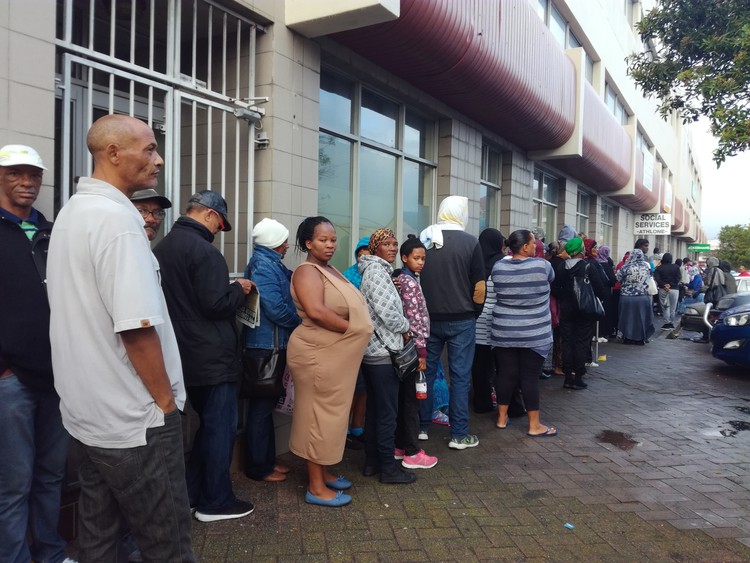SASSA says it’s on track to take over payment of social grants in 2018
Agency will appeal Gauteng High Court judgment in favour of Net1
“There’s no doubt about it. CPS (Cash Paymaster Services) will be phased out by 1 April 2018.” This was the assurance South African Social Security Agency (SASSA) CEO Thokozani Magwaza gave MPs on Wednesday.
Magwaza was speaking at a meeting of Parliament’s portfolio committee on Social Development, where MPs grilled him and Social Development Minister Bathabile Dlamini on the agency’s progress in taking over the payments of social grants.
In March the Constitutional Court extended SASSA’s five-year contract with CPS for another year while the agency made other plans. The Court reinstated its supervisory role after SASSA failed to meet its own deadline to institutionalise the payment of social grants after the five-year 2012 contract with CPS was declared invalid.
“We were given 12 months to phase out CPS,” Magwaza said. He also said that a workshop would be held with the South African Post Office next week to “ascertain things that the Post Office is going to help us with.”
He said SASSA was also considering getting its own special accounts for beneficiaries to “circumvent the ongoing incidents of unauthorised deductions”.
Magwaza told MPs that “things have been going well” since SASSA averted “what could have been a national crisis” on 1 April this year.
He, however, noted his objection to the ruling made by the North Gauteng High Court on Tuesday. The court ruled that deductions could be made from beneficiaries’ Grindrod bank accounts. The matter was brought by CPS parent company Net1 following revised Regulations 21 and 26A under the Social Assistance Act 13 of 2004. The regulations were published in May 2016 to stop deductions from the bank accounts of grant recipients. “SASSA will be appealing this ruling,” he said.
Dlamini also noted her disappointment at Tuesday’s ruling. “We have been fighting this for a very long time. We fought for the space where these mashonisas should not occupy payout points. Ordinary poor people from rural areas and informal settlements are being [targeted]. We thought this would be easy, but we’ve learnt our lesson now,” she said.
Dlamini said while the agency had been given a year to phase out CPS, the entire process of SASSA taking over the payment of grants would take up to five years and could cost around R6 billion.
“We have all agreed that this isn’t going to just take 12 months to bring the full programme into its totality,” she said.
Earlier in the briefing, SASSA’s programme head Zodwa Mvulane briefly presented a progress report. She said SASSA had until 17 June to submit its first report to the Constitutional Court.
The agency had submitted a list of names, following the Court’s request, of candidates for independent legal and technical experts to oversee the Agency’s work during its transition period. SASSA was yet to hear back from the Court, she said.
She said SASSA was still considering several options, including insourcing certain services, SASSA having its own special accounts for beneficiaries, collaborating with other government-owned entities like the Post Office, and using other departments to collect and store the biometric data of grant recipients.
To ensure beneficiaries were paid from 1 April this year, SASSA had submitted a cash request to the National Treasury of R11,175,538,000 for the payment of grants. The money had been paid by 16 March. “Payments went smoothly, despite the increased number of beneficiaries,” she said.
Several MPs, including the ANC’s Sibongile Tsoleli, raised their concerns about the protection of beneficiaries’ confidential data. Tsoleli, the DA’s Lindy Wilson and IFP MP Liezl van der Merwe also said they were concerned about the lack of time frames in SASSA’s presentation, noting that “there are only ten months to go” until the agency’s next deadline.
Support independent journalism
Donate using Payfast

Don't miss out on the latest news
We respect your privacy, and promise we won't spam you.
Next: Roads out of Gugulethu blocked by protesters
Previous: Campaign to disinvest in fossil fuels kicks off in Cape Town
© 2017 GroundUp. 
This article is licensed under a Creative Commons Attribution-NoDerivatives 4.0 International License.
You may republish this article, so long as you credit the authors and GroundUp, and do not change the text. Please include a link back to the original article.

